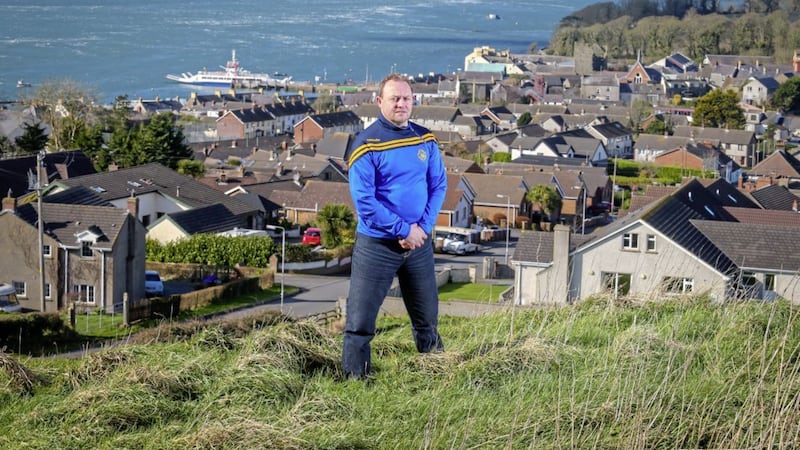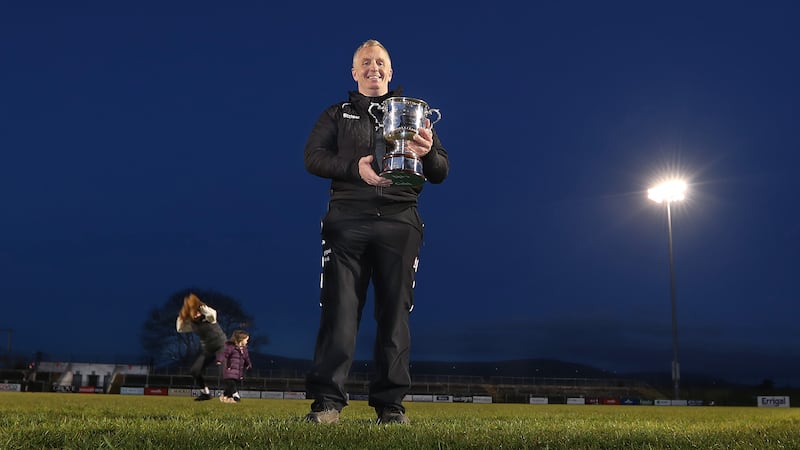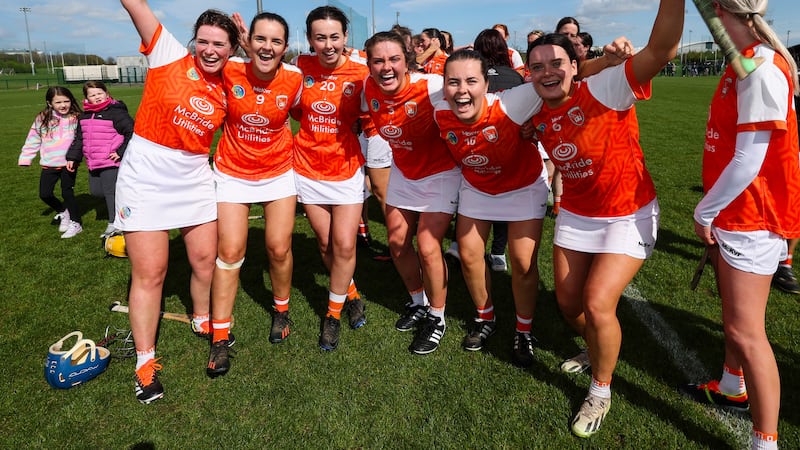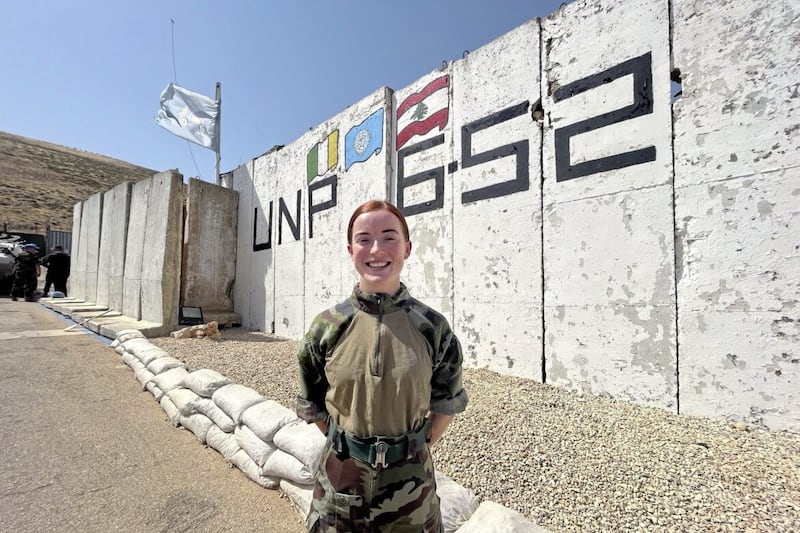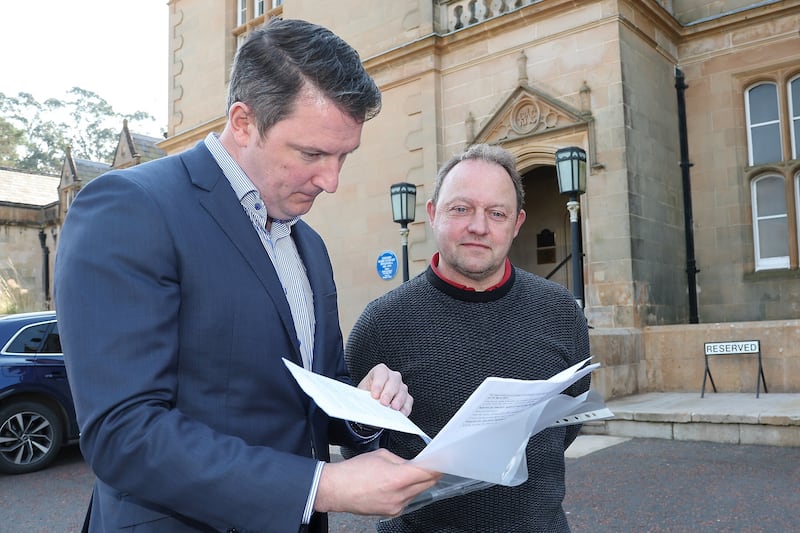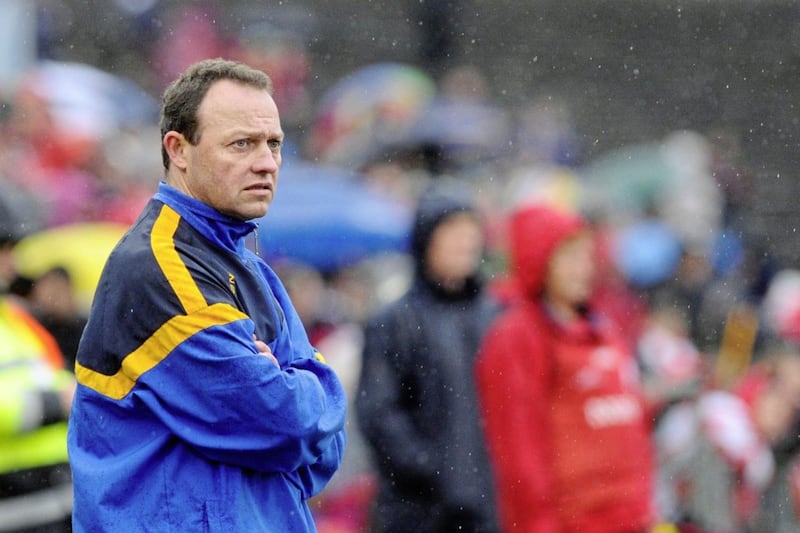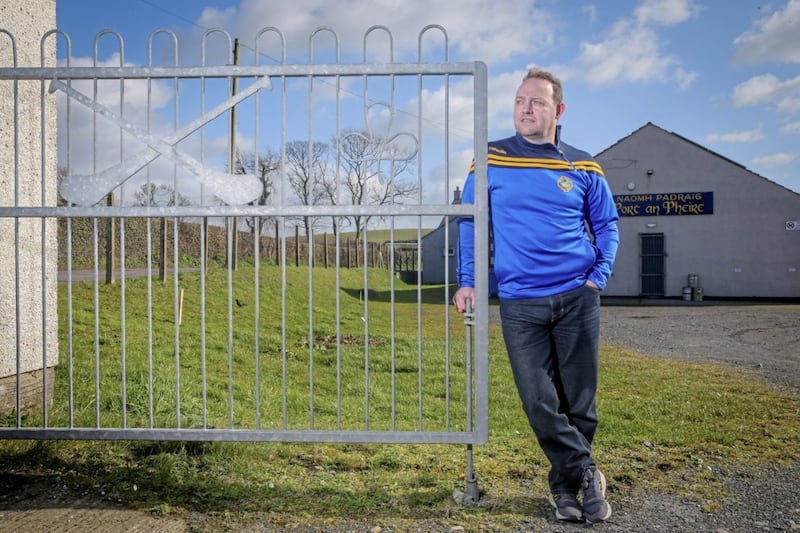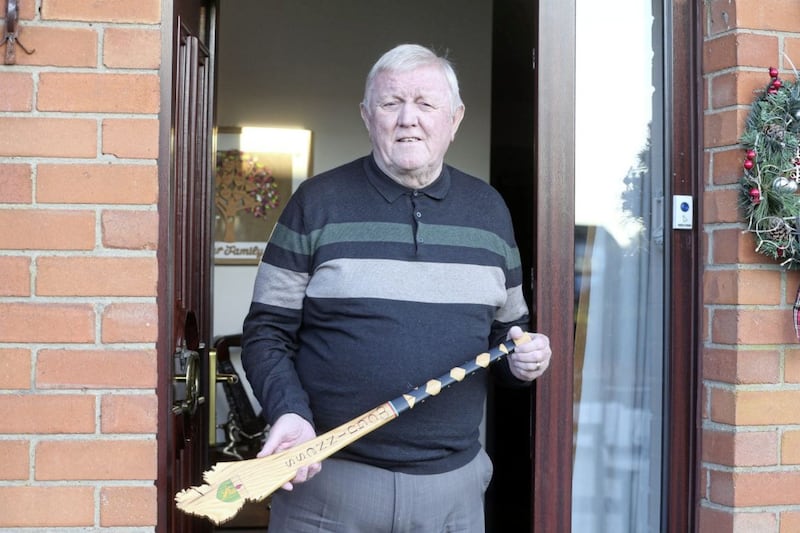In part one of an indepth interview, Noel Sands takes a trip down memory lane with Brendan Crossan and remembers the good days, the fun days and the bad days with Down hurlers...
“I’d admired Noel Sands. He was a winner. He was a grumpy wee boll**ks on the field and his name would always come up in the Antrim changing room before we played Down. He was a player we respected an awful lot because we knew he could hurt us.” – Terence McNaughton
THE front door swings open and you recognise the boyish smile immediately.
Eighteen summers ago, Noel Sands left the inter-county stage. Someone clicked their fingers and propelled us into 2020.
Some irrefutable truths about the Portaferry man. He was sheer class on a hurling field. A supreme goal poacher, one of the best pick pockets in the country. Supporters and defenders could never take their eyes off him.
Roguish and utterly fearless who didn't know how to take a backward step. He had more than a few skirmishes with officialdom during his career.
He was controversial. He was both difficult and easy to get on with. And the best team-mate you could ever have.
The brooding corner-forward was born for the big stage.
Three Allstar nominations probably should have translated into at least one black tie invite in the big smoke.
Now 51, the years have been kind to the Portaferry man as he welcomes me into his home.
He still looks fit enough to line for the club's reserves.
“He certainly belonged in the golden era of Down hurling,” says club-mate and former Down hurler Ger Adair. "It was a time when Down could compete with Antrim in Championship matches, players such as Danny Hughes, Noel Keith, Graham Clarke, Gary Savage, Paul McMullan, Chrissy 'Hunter' Mageean, Gerard McGrattan, Martin Bailie and Noel himself..."
Throw in the lion-hearted Marty Mallon, Gerard Coulter and Paddy Braniff, it's no surprise the Ardsmen went on to claim three unforgettable Ulster titles in the 1990's.
“Back then," Adair adds, "Down had super players. Noel had big presence on the field and attitude to go with it...”
It’s pre-lockdown when this interview takes place, a utopian time in our lives when nobody had heard of Covid19.
It's a beautiful day in Portaferry on this Friday afternoon.
The Sands household is much quieter than normal. Ann, Noel’s wife, is out running a few messages and Saoirse, their daughter, is packing her bags to join the Irish Army.
Daithi is in New York selling holidays to the Irish-American market and elder brother Eoghan is on the road working in software.
After a long civil service career Noel is now working for an insolvency company.
There are probably as many talking points in Noel Sands’ career as there are goals.
There were the idyllic Sean McGuinness years – “Right boys, let’s start trotting.” - Down’s breakthrough year of ’92. The memorable trips to the big house for a crack at Cork and Offaly.
The constant friction with Down officialdom.
Incurring Frank Dawson’s wrath and losing a year of his playing career. And the welcoming arms of the smiling Jimmy O’Reilly.
Then there were the heady days of playing in the Railway Cup with county team-mates Marty Mallon, Martin Bailie and Danny Hughes and rubbing shoulders with hurling's finest.
And there was nothing better than getting tore into Antrim on Ulster final day at sunny Casement Park. Those balmy afternoons and the crowds that flocked to Andersonstown will live long in the memory.
There were the desperate fractures within his own club over a presentation to a local RUC officer following his retirement back in the early 90s.
And the interminably long healing process.
There was also the day - June 2 2014 - he suffered a heart attack at just 45-years-old.
But we begin with the late Bo Dynes – the Ballygalget man who gave the teenager his chance with the Down seniors.
Sitting at his kitchen table, his mind wanders back to the mid-1980's.
“Bo Dynes was my first manager in Down… He brought me and Marty [Mallon, his brother-in-law] in in ’85, just to give us a taste of it.
“All of a sudden there was a mass exodus from the team in ’86. The next thing, you were looking around the changing room and there were about 20 players, and we thought: 'We've a chance of getting on the team here.'”
After dabbling in Gaelic football (Down minors and U21s) and soccer Sands' calling was always stitched leather and ash.
And yet, his senior inter-county hurling career almost hit the rocks before it set sail.
Smiling at their youthful recklessness, Sands remembers: “We were away to Roscommon one Sunday and at that time Down weren’t doing overnight stays. The county board would always say: ‘No, we can’t afford it. It’s a four-hour trip down, four-hour trip back. Play your match and that’ll be it.’
“Anyway we won the match. I was still 17, coming 18. On the way home, of course, we’d bought a few drinks for the bus.
“We didn’t get our overnight stop, so we shouted down the bus: ‘Guys, can we stop at a wee village for a few drinks?’
“And they shouted back: ‘No, you’re not getting off the bus.’
“Chris Mageean, Paul McMullan, myself, Marty [Mallon], Lawrence Mason – I think there were five Portaferry boys and one Ballycran boy who was Danny Hughes.
“Anyway, we were running dry on drink, so we thought we’d get the bus to pull over. I think we stopped just outside Monaghan town to go to the toilet.”
The stop proved to be their Alcatraz. The town's distant lights, packed pubs, delirious fiddles and smell of cigarette smoke and strong whiskey represented freedom. At least for one night.
They could make a run for it and have a beer in their hands before too long.
“We were all discussing it before we got off the bus: ‘We’re not too far out of town. We’ll run back in and they can come and get us if they want.’
“Four or five of us were standing at the back of the bus and we could see the town lights and I remember there was snow on the ground. And the next thing, we just ran.
“We ran for the town and the bus came after us. We ended up hiding in a graveyard, there was snow everywhere. The bus pulled up at the churchyard and we were hiding behind the chapel.
“Bo Dynes and Paddy Mason was along with him – that was Lawrence’s father. So Paddy shouts up at us: ‘Come down, lads. Be sensible about this. It’ll be alright.’
“Paddy was trying to talk us down. It was dark. It was cold.
“There was bramble over the wire fence that led to the outskirts of the town. And I remember Lawrence shouting back at his father: ‘F**k off Da, we’re away!’ (laughing)
“So we jumped the fence, over the bramble and down into the town and we got lickered up. Danny Hughes was an absolutely fantastic hurler and an absolute rocket as well. He was on the microphone singing in the first pub we went into.
“We woke up the next morning thinking: ‘What the f**k have we done?’
“The bus had to go on without us… We were making phone calls left, right and centre. At least we got our overnight in the end.”
Dishevelled the following morning the six county hurlers thumbed lifts back to Belfast before getting a loan of a few pound to get back down to the Ards.
“I was 17 and I was thinking: 'That’s my career down the tubes before it has even started.'”
When the escapees got back to base their club wanted them to write a letter of apology for their actions. Sands refused.
“I said: ‘Hold on, it’s nothing to do with the club.’ But they saw it as bringing the club into disrepute even though we were playing for Down.
“So the Portaferry manager at the time Cathal McGrattan said to me: ‘What if I write the letter and you just sign it? I said: ‘No, Cathal.’
“He’d written a few letters for the other players.
“I didn’t sign it. Cathal wrote a letter for me, signed it and sent it in.
“That kind of mapped out the rest of my career. You could hang me for it but I wouldn’t do something if I didn’t believe in it.”
***********
IT took some maturing of the younger members of the squad and a swaggering Belfast man to finally see Down hurling reach the provincial summit.
Sarsfield’s clubman Sean McGuinness was a hugely respected hurling figure and turned out to be the perfect fit for the Ardsmen.
Initially, though, it was a bumpy ride for McGuinness. The players had to get used to him and McGuinness had to get used to them.
They met somewhere in the middle.
In '89, Portaferry had just retained their county title and were planning to sit out the first couple of county league games with Down to prepare for the Ulster Club.
"Listen," McGuinness said, "we need these Portaferry boys. The Ulster Club isn’t for a few weeks…’
“I think one or two agreed to play," Sands remembers. "Anyway, Marty Mallon went in first. Marty's lifeblood is hurling. He would’ve played hurling no matter who he was playing for. Marty was first into the changing rooms.”
But there was one problem. The Portaferry boys were late. Some later than others.
“I was about five yards from going into the changing room door and Paul McMullan and Chris Mageean says to me: ‘Don’t even bother going in there, Sands, because he’s just bucked us out.’ So I never even got the chance to go in.”
“I remember watching the match that day in Ballygalget. Down were eight points up and in the last five minutes Meath got a goal and got another goal. And, bang, a third goal went in. Marty was on the bench and he put him on, but they were already beaten.
“Later, Sean called a few meetings. Sean was a great man for getting everybody together.”
Against the odds, McGuinness guided the Ardsmen to two provincial titles in ’92 and 95.
Having just completed their debut season in Division One, the Down hurlers were ranked 4/1 underdogs against an Antrim side who had eyes on making another All-Ireland semi-final appearance - but Sands and co sauntered to their first Ulster title since the Championship had resumed four years earlier after a 38-year hiatus.
Afterwards, defeated manager Jim Nelson succinctly observed: “The difference in the two teams was that Down were more determined to win.”
Sands recalls: “The day we won the 1992 Ulster final was always described as the ‘Glorious 12th’ because it was played on July 12. It was a really sunny day and Antrim and Down were playing Division One at the time; you were starting to get good crowds. Casement Park was a brilliant place to play in, a fabulous pitch.
“The grass bank was packed, the stand would be packed, there would be thousands of people there cheering you on. They were literally the glory days.”
The bigger the stage, the better Sands performed.
“1992 was a dream. We weren’t used to all the media coverage we got. The late Jimmy Magee was up interviewing us when we had a press night. We were saying to ourselves: ‘What the f*** is a press night?’ (laughing)
In their gutsy All-Ireland semi-final defeat to Cork a couple of weeks later Down's razor-sharp corner-forward grabbed 1-3.
“I was captain that day and I remember the roar when we ran out onto Croke Park. When I scored early on I lost the run of myself. My feet hadn’t touched the ground and the ball was in the back of our net. That’s how ruthless Cork were.”
Three years later McGuinness delivered again with the Down hurlers overcoming Antrim after a replay, with Sands weighing in with 1-2 in a six-point victory.
The-then 26-year-old hit the same tally in their All-Ireland semi-final loss to Offaly at Croke Park.
Despite their heroics, Sands always felt the hurlers were under-appreciated by county officialdom.
If something needed to be said you could bet your last pound Sands would say it.
After the 1992 All-Ireland semi-final, the players and partners enjoyed a no-expenses-spared night of celebration in the Carrickdale.
Three years later, it was a different story when they returned from Croke Park.
“It was decided the wives and girlfriends wouldn’t be getting a meal,” Sands recalls. “In ’92 we had a big reception. There was a whole load of people back at the Carrickdale, everything was looked after because our partners had sacrificed a lot; the least they could do was provide a meal.
“After the semi-final in ’95, a few of us sat at the bar and didn’t go in for the meal… We were constantly arguing with the county board.
“There was a player welfare group set up by the GAA… The expenses were always “coming” from the county board so I remember I was put up as the players’ representative and I rang Jarlath Burns who was in charge of the player welfare group.
“I said to him: ‘The football boys are getting this, that and the other. And Jarlath said: ‘Leave it with me.’ Within a week, it was sorted.”
During his time on the peninsula McGuinness squeezed everything out of the players.
“Sean McGuinness changed the landscape of Down hurling,” says Sands matter-of-factly.
“He was from Belfast, he had that swagger, that confidence about him, he was organised.
“He’d say: ‘Right boys, let’s start trotting.’ We took the piss out of him and his Belfast accent and he was willing to take it. He was like a father figure to us and a great motivator.”
Gerard Coulter held temporary reins in ’96 before Frank Dawson arrived – and although the new manager and Sands never quite gelled the St Gall’s man guided the Down hurlers to the 1997 Ulster title, again at Antrim’s expense.
Dawson’s tactics in the decider worked a treat. Sands grabbed an early goal at full-forward and then withdrew to midfield where he orchestrated another brilliant victory.
But in Dawson’s second year, the friction between the pair resulted in Down’s star player being dropped from the panel.
“I didn’t think the training was good enough and a couple of Frank’s selectors heard about it and knew there were rumblings in the camp.
“I said to Dawson: ‘What’s going on?’ And Frank said: ‘I want to meet with you separately.’ I had to go to Strangford Credit Union for a meeting with him and there were county officers there too. I brought Chris 'The Hunter' Mageean with me to the meeting.
"Chris played with me up front and always had my back in a scrap.
“That year, I felt they were isolating me. Frank probably did the right thing in his eyes… At the meeting, he said: ‘Listen, Noel, it’s not working out, so we’re going to have to leave you off the panel.’
“I said: ‘What? You boys better know what you’re doing. So I was off the panel. I ended up watching Down get slaughtered by Antrim at Casement Park which was hard to take.”
The fact that one of Down’s best forwards had been ostracised for speaking out upped the pressure on Dawson. And with a fine Derry side making a charge in Ulster and on the verge of overtaking Down, a managerial change was coming. Dawson left after three years with an Ulster title against his name. Jimmy O’Reilly took over in 2000 and Down’s prodigal son returned to the fold and was made captain.
In Monday’s Part Two, Noel Sands recalls the day he suffered a heart-attack, a red card he regrets and what hurling has given him
